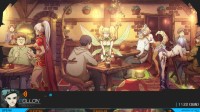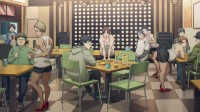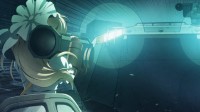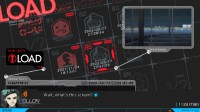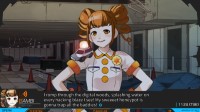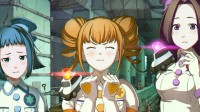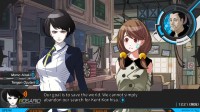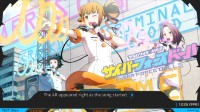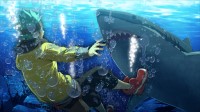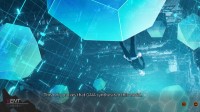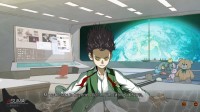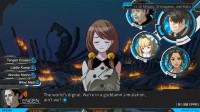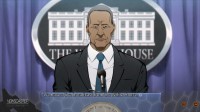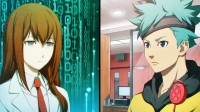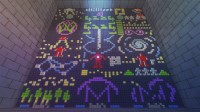Anonymous;Code
Playtime: 20.9 Hours
Finished 29 April 2025.This was the final entry of the Science;Adventure saga in my experience - at least in relation to all content available up until 2025, which is when I played this (as of writing this, there was a recent Steins;??? game announced). With the exception of the end of O;N - which is only available through the anime - I have finished all the other relevant VNs, including S;G, S;G 0, R;N, R;N DaSH, C;H NoaH, C;C, and Volumes 1-3 of the O;N LN. I didn't play the Chaos LCC games since those aren't officially translated, and didn't seem to be particularly important at a conceptual level for this game.
Somewhat ironically, I found A;C quite difficult to get working. Since I bought it on my Steam alt account, I was hoping that I could play it on my SP9. However, due to some issue with integrated graphics, the pre-rendered video sequences (not the game itself) would consistently crash the game whenever they played, which basically means I couldn't get past the first 3-4 minutes. So instead, I had to swap accounts on my main PC and play it on the big monitor instead, but even then the game does not properly support any resolution greater than 1080p (the game upscales to 4K in fullscreen mode). It's insane to me how many technical issues I faced with this game that I have never had any issues with in any other modern VN. Thankfully, I got used to most of the quirks by the time I finished it.
Anonymous;Code is technically supposed to be a culmination of sorts for the entire Sci;Adv series at large, with references to most of the other games. However, I felt like it was too heavily mired in technical and conceptual issues that really prevented it from reaching its full potential, whatever that might have been. I really like how it gets directly into the action; unlike all of the other Sci;Adv games, there isn't a 10-15 hour boring leadup at the start of the game where you have to deal with an obnoxious main character before things start happening. The first 5 minutes of the game involve Pollon (the main character) immediately getting into trouble against Special Ops, and managing to escape. Things don't really slow down afterwards, either; the fundamental mechanic of this game (namely the Save/Load feature) is pretty thoroughly explored within the first 2 chapters.
The fast pacing is a surprisingly controversial aspect of this story, but it is true that the characters have far less development here than in the other Sci;Adv games. Other than Pollon and Momo, nobody's backstory is really explored, and the game doesn't really dive into anyone's motivations either. Pretty much all details are loosely handwaved away at the convenience of the story, and the "villains" of the game are so singularly focused on the end of the world that they're written like mindless drones otherwise. What this also means is that the strengths -- and the weaknesses -- of this game rest entirely on the way the core concept of this game is executed, which is quite hit or miss for me...
Even at the most basic level, I question the quality of the game's writing. All of this talk about "hacking" and computer wizards in this game feels so ridiculously arbitrary that it kind of took me out of the atmosphere before anything even happened. The global infrastructural damage that hacking does in this game, and the way that "hacking" is applied, are comically stupid, reminiscent of keyboard warrior """"hacking"""" that you see in trashy movies and old TV shows. The problem to me is that Sci;Adv usually tries to explore these concepts in depth, but the way that the concept of hacking is portrayed in this game is fundamentally shallow. I know that Sci;Adv typically isn't particularly concerned with "hard science" in the same way that Muv-Luv or other games try to stay relatively consistent with the physics and theorems of our real world, but the lame portrayal here is honestly a bit too ridiculous for me.
Beyond me harping on about the 'hacking' in this game, I feel like most of the story is decent but maybe not particularly special. Using the Save/Load mechanics, Pollon narrowly averts three major cataclysms and manages to barely survive against the efforts of the Holy Office 513. For most of this, the Save/Load "Hacking Trigger" (what?) is only used a couple of times, and as a whole the mechanic just feels like a watered-down version of Steins;Gate D-Mail. At the fourth event, Pollon is unable to prevent Azuma's mother from dying, so for some reason this dumb kid throws a tantrum that ends the world. Again, Pollon's realization that he can't avoid the death mirrors Okabe's realization that the D-Mails and time skips have unintended side effects; rather than feeling fresh or new, it just kind of felt exhausting seeing another Sci;Adv game go through the exact same steps all over again. Eventually, some shenanigans happen that cause the world to be "reset" and saved. The concept of world layers generated by an infinite loops of quantum computers simulating realities with other quantum computers is neat, but it doesn't account for exponential processing power, nor the very real effect that extraterrestrial behavior has on our world - again, this isn't really a hard science VN. That said, there is mention that QCDCs cannot simulate space, yet Asuma is able to will an asteroid into existence, which seems like a contradictory statement; I'm not sure if I misinterpreted something or if this just another issue with the writing.
In general, I feel like this game has an unending list of issues in its writing that I just can't quite get over. The entire cast is completely boilerplate and nobody is really given a chance to develop a unique character (not even Pollon or Momo - despite moments of characterization, they are built from collections of very stereotypical tropes). The problem with the "self-awareness" of this world is that none of the characters never feel like they have any depth. I'm given no reason to care about Generic Anime Protagonist #1000 talking to me through the screen, since the writing doesn't seek to suggest he has a real life of his own outside of his utilitarian part in this linear story (which does not branch, by the way). Of all the Science;Adventure games out there, I feel like this would be the one in which the branching paths and little details would be by far the most important - yet this is the only one that has little to none of that.
The "villains" of this game are even sillier, in my opinion. The entire Vatican faction and the Holy Office 513 are literally just random villains of the week that were arbitrarily written into the game to provide "exciting challenges" against Pollon. The powers are completely arbitrary, and despite the knowledge that the concept is consistent with the "virtual" world layer in which the game takes place, random superhero powers with less backstory than the most generic Marvel character really doesn't go over well in this game either. The Holy Office goons are just really lame from any standpoint I can think of - it doesn't help that they also do the whole song and dance with randomly quoting parts of the Bible. I can only imagine that the writers really wanted to hammer home how delusional and nonsensical religious zealots are by making them as pathetic as possible. Asuma's entire schtick is kind of stupid as well - despite becoming completely omniscient via connection to the upper layer's GAIA, he still seems to get distracted and confused by very basic things, and has very arbitrary restrictions on what he is able to do somehow. Why didn't he delete the Vatican, and why wasn't he aware of all the other activity going on around him? Despite being shown to be very adept at multitasking earlier in the story, he somehow becomes a simpleton throwing a tantrum at the end. Again, kind of a poor show.
Probably the biggest disappointment for me throughout playing this game is how little all of the other game concepts actually mattered by the end of it. Amadeus from S;G 0 is very important for sure, and the worldline concept from S;G is also mentioned in passing though not actually relevant to the world layers, but Gigalomania isn't really of any consequence (Holy Office & Asuma's powers are derived elsewhere), and R;N's virtualization and AI are only important in the sense that everyone in this story is technically in a simulated world. Nothing in O;N is even referenced at all, other than the Mumu magazine that is still somehow surviving in print in 2037. I kind of feel like I wasted my time a bit in preparation for A;C.
On top of all my other issues, I've also got a few bones to pick with this game on a technical and mechanical level as well, which is particularly strange given that this is a Visual Novel. Firstly, the Save/Load mechanic is integrated extremely awkwardly into the game - the files that Pollon generates during the game overwrite your actual save slots - which can really fuck up your save structure if you're trying to keep it organized. It's a small, but extremely obnoxious issue. On top of that, the Hacking Trigger (aka telling Pollon when to load) is really finnicky as well - it feels like you often only have a single line that you can use it on, even if there is an entire scene in which it would make sense to kick it back in time. You sometimes have to go through like 3 minutes of a "failure" state before the one line of text that you can use; super awkward, makes it seem like the "Anon" hacker has Pollon on the second monitor. Maybe that's more realistic, given that his adventure is honestly kind of lame.
Finally, this might be the absolute worst UI/UX of any Visual Novel I've ever played - and if not so, it is definitely the worst among "modern" VNs released within the last 10-15 years. Playing on the PC, keys are unbindable and assigned to completely arbitrary keys (including F-keys and the Numpad) on the keyboard. Notably, the menu is '1' and 'Esc' instantly opens a prompt to quit out of the game, something that you can NOT do from the main menu! Using mouse control, you can only access the menu by clicking the system button on the screen - and there's no way to quit without use of the keyboard. On top of that, the in-game UI changes forms (also changing the location of every button) between several different layouts depending on the character & scene, the main menu is less than responsive at times, and the tips menu is horribly organized (three sections, but two of them have only a single entry each while the other has the remaining ~100).
At the end of the day, I don't think this game is entirely awful - and to be fair, it does have some implications for the Sci;Adv series as a whole given that it implies that the entire series' universe takes place within layers of simulations. But in my mind, this is unequivocally the weakest entry in the series by a very long shot, and I worry about the quality of the upcoming games, given that this took several years of development and even lacks branching routes. I feel like my opinion has continued to decrease the more I think about it after completing it; I enjoyed it quite a decent amount while I was going through it to be fair, but I can't help but consider how weak the concepts are written and utilized in this compared to all of the other games. I'd really hate for the big S;A crossover to be on such a dud, but I honestly can't say I have any confidence in future entries in the series either given how mediocre both A;C and R;N DaSH have been. Maybe this series's time in the sun is coming to an end.
